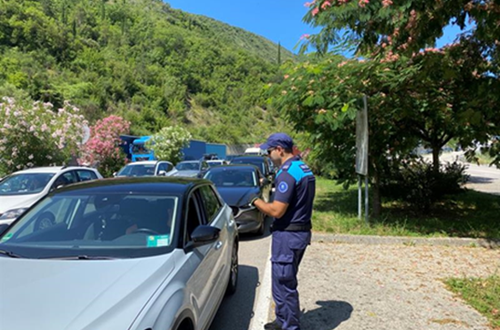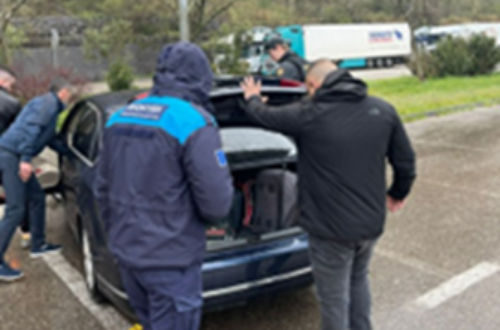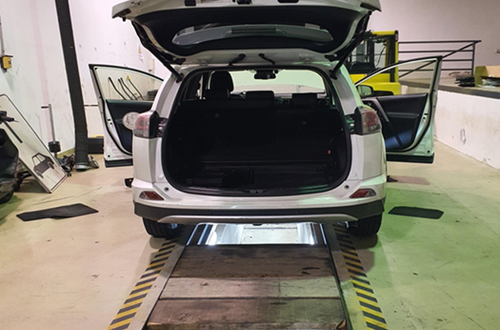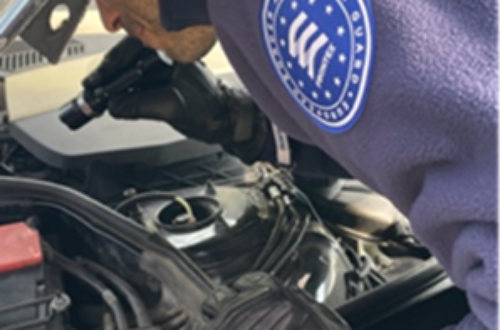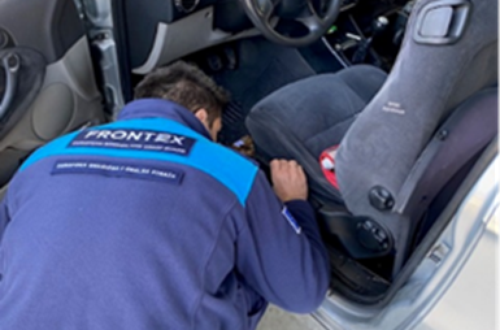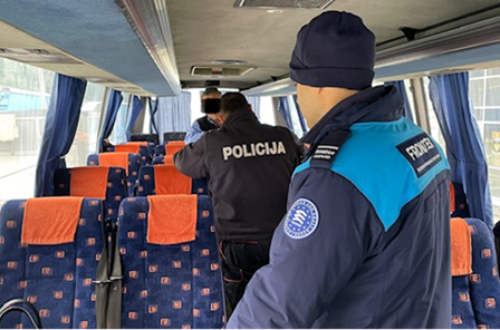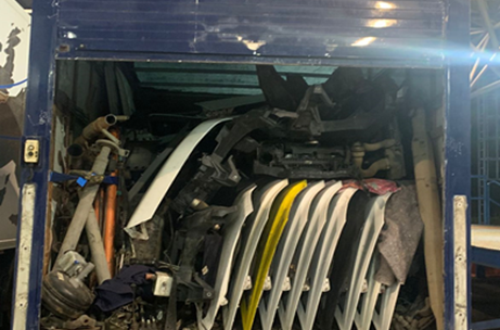There are two things that help border guards attain a high level of professionalism – one is specialist knowledge and the other is sixth sense. Their instincts help them to spot and observe anomalies, compare them to previous experience and act accordingly. Knowledge is needed to act rationally and lawfully. For cross-border crime-detection officers at Frontex, these two elements are perfectly aligned through robust training. Let’s take a closer look at their role and training.
Sandrine – Poland, Frontex headquarters
Sandrine left the Paris Police Academy to join Frontex in 2022. Back in France, she had worked as a police officer and, more recently, as a trainer and training designer, which paved the way for her international cooperation projects at the UN. When she was appointed to lead the cross-border crime-detection (CBCD) training project at Frontex, she set to it and redesigned the curriculum with her enthusiasm and insightful practical knowledge.
“The most important thing in any training for adults is that everything is put into practice. You need content that is very close to the participants’ reality, whether they are experienced or not. What is essential is to let them experiment and test everything that you teach them. The first step is understanding what cross-border crime is and what skills a border guard needs to detect it.”
Cosmin – Croatia, airport: land border crossing
Fighting illegal migration flows in Romania equipped Cosmin with excellent observation and search skills. He participated in the CBDC training that took place earlier this year with a lot of prior knowledge already. He explained that the CBDC profile encompasses everything.
“My job is very versatile. As a CBDC officer, I support the local team in all their profiles: I select vehicles to search, I verify documents, conduct interviews, and look out for any potential victims of human trafficking. My role is to be very perceptive and see all the little details that normally pass unnoticed by other people. I do it based on the risk analysis for my area. The main idea is to stop any kind of crime from crossing the border.”
Georgios – Montenegro, checkpoint: land border crossing
"I was a police officer in Greece, investigating different types of crimes. I was combating human trafficking. In Frontex, as a CBCD officer, my focus is on detecting cases of transnational crime, such as smuggling, human trafficking, and terrorism. Based on risk indicators, I conduct short interviews with the passengers who arouse my suspicions. My border crossing is in a third country so more often than not I detect attempts to smuggle illicit goods or illegal amounts of money into the EU. Because of my prior experience, I pay special attention to minors at the border. I always try to understand the relationship between the adult and the minor crossing the checkpoint."
Back to Sandrine for more details on training
Frontex offers two modules as part of its CBCD training: land and maritime. Both include a comprehensive review of the legal bases, customs procedures, and fundamental rights, but the way Sandrine has conceptualised it is that their overarching goal is to give future officers as much practical experience as possible and provide them with continuous assessment along the way. She explains patiently that assessment is necessary, not to generate stress but to create more knowledge.
“The CBCD training offers an opportunity to improve in every area: interviewing techniques, checking goods and documents, vehicle searches, places of concealment or the handling of weapons (in the land module); and sea documents and protocols, containers and seal tampering, or risk indicators for vessels (in the maritime module). There are some individual tasks, but we insist on teamwork. Cross-border crime requires cooperation, and Frontex has the natural advantage of having an international network of officers who can communicate freely and exchange information, which is a great support to the Member States. When participants leave the training venue, I want them to feel confident that they can start working independently in the areas where they are deployed.”
None of it would be possible without the trainers – they are elite experts from various Member States’ border, police, and customs forces. It does not suffice to say that they share their know-how. They often go beyond standard teaching techniques and reinvent, restructure, and reshape the content to match it best to the specific needs of Frontex officers in their international context.
Laura – Albania, seaport: maritime crossing
“I was working in Rome as a police inspector, and then I moved on to the Directorate of Immigration and Border Police. I have always been curious and very observant of my surroundings. I simply need to understand what is happening. It’s a fundamental trait in the CBCD profile because you constantly need to be on the lookout for specific cases, based on the local risk analysis. At my port, I support colleagues in searching boats and ferries, checking documents, whatever they need. I see anything and everything, especially human behaviour. It’s usually a number one indicator that something is out of the ordinary. In the CBCD training, the technical part was new to me – how to remove seals on containers, how to open certain compartments on a ferry. There was also a lot of emphasis on communication with travellers, and how to stay calm and matter-of-fact. It was very important because people can grow very impatient and irrational when they are selected for a ‘second line’ check.”
Georgia – Romanian border with Ukraine: land border crossing
“Back in Greece, I was a police officer. My tasks included document checks, criminal investigations, and child protection. This background prepared me to handle the challenges of working in the CBCD profile but also made me particularly attentive to children and vulnerable people at the border. At Frontex, I was trained in interviewing techniques that are specifically tailored to interaction with potential victims, suspects, and witnesses, enabling me to detect and deal with cross-border offences effectively. It is very different to interview a child than an adult, a victim than a suspect. You need a special approach to convince a young woman at the border that she is a potential victim of trafficking. There are specific things to check and specific rules to apply, as, for instance, smugglers may use a baby to put pressure on the guard and accelerate the check. Moreover, the training emphasized the importance of recognising indicators of different types of cross-border crimes. Being familiar with them helps us to identify suspicious activities more easily and take appropriate action. Last but not least, the training emphasized the significance of safety measures and the use of protective equipment. Not only does it apply to crime scenes, but also to our day-to-day tasks at the borders. Ensuring our own safety allows us to better protect and serve the individuals crossing the border.”
The assessment never ends… and with good reason
Some months after the officers took up their posts at ports, airports and border crossing points, a new special event was organised in July 2023 – a CBCD Roadshow. Cosmin and Georgios met in Debeli Brijeg, the biggest border crossing point in Montenegro, to check vehicles, verify documents, and exchange experiences. This campaign was organised to raise awareness among passengers crossing at this point, but it also provided an opportunity for Sandrine and the trainers to observe their ‘students’ in real-life situations and provide them with more feedback on their routines.
“I wanted to add this post-training assessment stage to see how things work in the field,” explained Sandrine. “This will help me to adapt future training to constantly changing conditions, but also to identify what equipment is needed for CBCD officers. In this sense, the training team cooperates very closely with operational units to equip all Frontex CBCD officers with a standard toolkit so that they can learn to operate it as part of the training and use it wherever they are deployed.”
Cross-border criminals keep inventing new strategies to circumvent border control systems, and so the training of officers with a CBCD profile can never be static. It must reflect the ever-changing reality of the border and update the border guards’ observation and search techniques to detect all signs of potential and new crime. Professional training is designed to equip them with state-of-the-art practical knowledge and, maybe even more importantly, to give them a training ground for their detective instincts.
“Training is a relationship, a relationship of trust. You cannot force adults to learn but you can create an environment that makes them curious and quicker to absorb or practice new things,” Sandrine summarises. “I always say if you have a different idea about doing a search, go ahead and try. Training is also needed because we learn by making mistakes. Make as many mistakes as you can during the training because what you learn you will never forget.”
